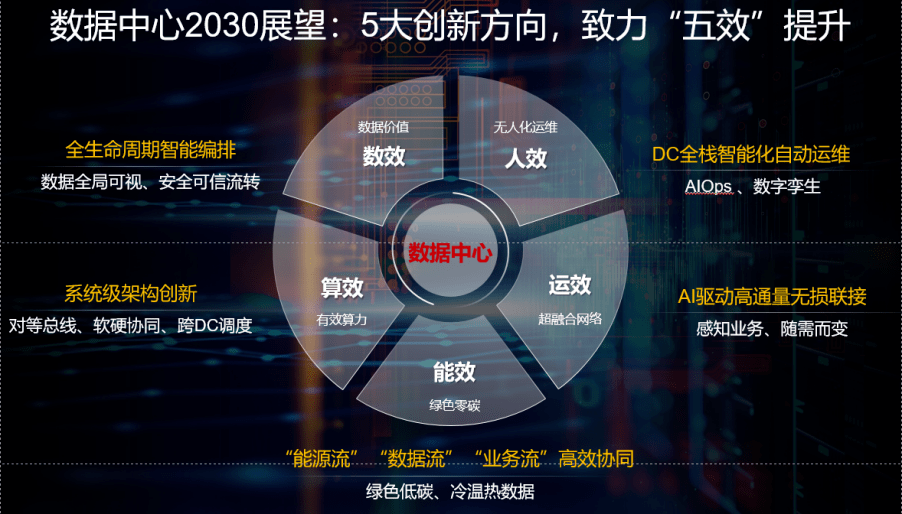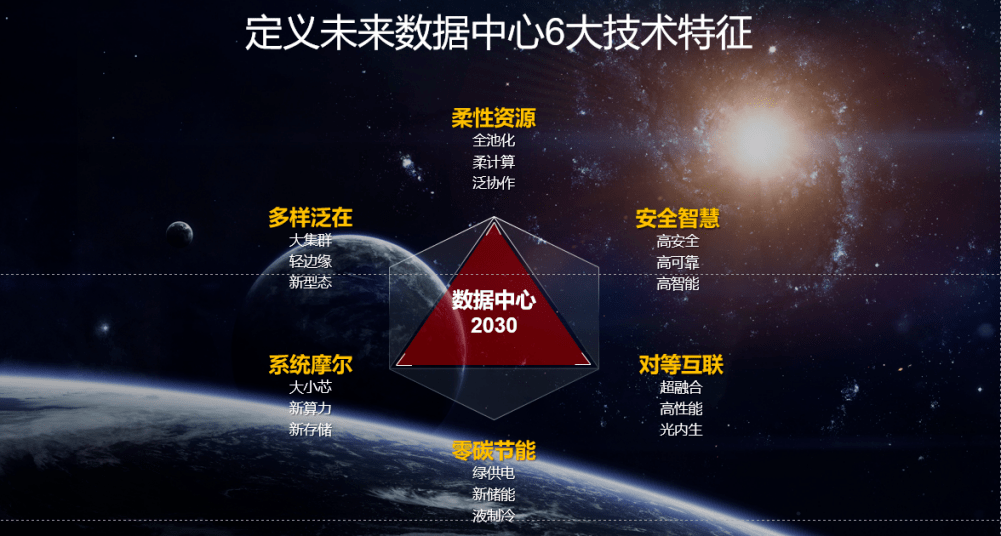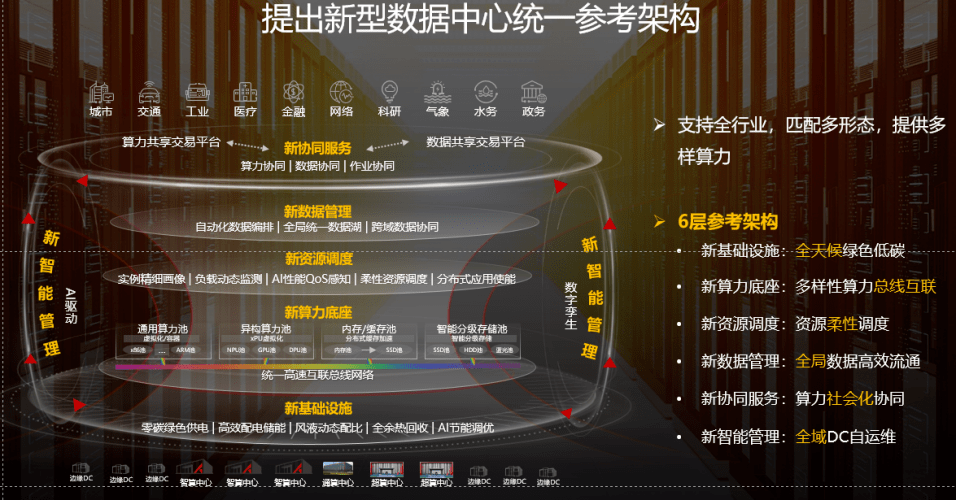Home >Technology peripherals >AI >The 'emergence' moment of artificial intelligence: How do data centers solve problems?
The 'emergence' moment of artificial intelligence: How do data centers solve problems?
- WBOYWBOYWBOYWBOYWBOYWBOYWBOYWBOYWBOYWBOYWBOYWBOYWBforward
- 2023-11-23 12:30:491286browse
When hundreds of large AI models for industries appear, the data center hosting the large models is quietly changing. Large models require large computing power. On the one hand, data centers will provide diverse computing comprehensive capabilities as the computing power base for digital transformation to meet the intelligent needs of different industries; on the other hand, data centers continue to improve energy use efficiency, which requires A better computing architecture and lower energy consumption generate greater computing power, which not only achieves green and low carbon itself, but also empowers the intelligent transformation of other industries and promotes the carbon reduction of the whole society.
Data from the Ministry of Industry and Information Technology shows that in 2022, the total size of data center racks in use in my country will exceed 5.9 million standard racks, the number of servers will be approximately 20 million, and the average annual growth rate of data center storage capacity will exceed 50%. At the same time, against the background of the explosive demand for data and computing power in the whole society, the power consumption of data centers has inevitably increased rapidly. So, facing the dual test of "computing power" and "consumption reduction", how will future data centers continue to optimize, grow steadily in scale, and gradually improve energy efficiency? What will the data center of the future look like?
Recently, Huawei released the "Data Center 2030" report, which provides a reference direction for the transformation and upgrading of future data centers.
Innovation emerges and the new direction of development around “five-effect improvement”
Today, data centers are almost closely related to daily life. Familiar terms such as AI, cloud computing, smart cities, and the metaverse are all inseparable from the support of data centers. At the same time, trends such as energy conservation, sustainability, and safety are also gradually strengthening. Major enterprises are increasing investment and construction of data centers to meet the growing demand for computing power.
It is foreseeable that with the rapid growth of the global economy, the development and construction of data centers will continue to be in a period of rapid development. Coupled with the strong support from emerging industries in various places, it has brought great opportunities to the development of the data center industry. Advantage.
Without changing the original meaning, the content needs to be rewritten into Chinese. What needs to be rewritten is: But with rapid development, choosing the direction and path has become a kind of ability and wisdom. Computing power requirements and resource constraints are the main challenges for future data center development, and innovation needs to be centered around improving efficiency
"Data Center 2030" starts from the five major future scenarios affecting data centers and points out that the future development of data centers will show a number of important trends. The report predicts that computing power will show rapid development, and computing power and scale efficiency will become national and The core competitiveness of enterprises; at the same time, driven by AI, a panoramic revolution will occur in data centers. The industrial label of data centers will transform from high energy consumption to green development enablers. Multi-stream collaborative data centers will also become popular. This builds a green, low-carbon, and leading data center with computing efficiency.
It can be seen that the development of future data centers is a fast-changing and challenging process. If we want to figure out the future data center, unlock the digital economy, a market with huge imagination, and promote the high growth of enterprises in the data economy era, we need some new ideas to solve the "multiple higher-order equation" of the current data center.

In order to cope with breakthroughs in scientific research and resource demands for computing power, data centers under the new situation are in urgent need of technological innovation and model changes. The "Data Center 2030" report points out that future data centers need to improve their performance in five aspects: "energy efficiency, computing efficiency, operation efficiency, digital efficiency, and human efficiency" to cope with the computing power supply and energy consumption caused by large artificial intelligence models. challenge
Optimize energy efficiency to build a green zero-carbon data center; improve computing efficiency to achieve efficient supply of data center computing power; enhance operational efficiency to create a hyper-converged data center network; improve digital efficiency to maximize data value; ultimately improve Human efficiency, realizing automated data centers. It can be said that the improvement of "five effects" points out an important direction for the technological innovation of future data centers
It is the holistic perspective that defines the technical characteristics of future data centers for the first time
With the development of cloud computing and artificial intelligence in China, the scale of ultra-large-scale data center applications continues to increase, and the construction concept of data centers has also changed. The most typical change is that the construction of data centers and IT equipment are more integrated. close. As an infrastructure, the data center will also undergo top-down changes accordingly. To realize the linkage between applications and technology from a business perspective, the data center needs to consider cooling, power supply, monitoring and operation and maintenance as a whole to achieve vertical integration
The mainstream of future data center technology development will be achieved through system-level innovation, which means that the next generation of data centers needs to break the tradition and greatly improve the efficiency of the data center through software and hardware collaboration
Specifically, what are the key features of future data centers? What are the evaluation indicators for new data centers? The "Data Center 2030" report believes that new data centers in the future will have six major technical characteristics: diverse ubiquity, security and intelligence, zero-carbon energy saving, flexible resources, peer-to-peer interconnection, and system Moore.
Diverse and ubiquitous: In the future, data centers will move towards the polarization of ultra-large clusters and ultra-light edges. At the same time, facing new scenarios, a variety of innovative data centers will also appear, such as space data centers, undersea data centers, etc.
Security Intelligence: Future new data centers need to have the characteristics of high security, high reliability and high intelligence. Al and data enable the entire life cycle of data center planning, construction, and operation, promoting the development of data centers in the direction of high efficiency, energy saving, and intelligence.
Zero-carbon energy saving:The proportion of clean energy such as wind energy and solar energy in the energy structure of the data center increases. At the same time, energy storage technology has become an important way to reduce the power cost of data centers through "peak shaving and valley filling"; liquid cooling technology helps data centers save energy and reduce noise.
Flexible resources: Cloud architecture will become one of the "standard configurations" of future data center infrastructure. The next generation cloud data center architecture will follow the lines of "full pool" and "soft computing" , the direction of "pan-collaboration" continues to evolve.
Peer-to-peer interconnection: In order to improve data processing efficiency, future computing will break through the bottleneck of the von Neumann architecture. Computing, storage and communication modules are peer-to-peer interconnected through a unified bus. In the future, new data centers will have Features of hyper-convergence, high performance and endogenous light.
System Moore: Moore's Law, which dominates the development of semiconductor integrated circuits, is encountering dual limitations of physics and economics, and there is an urgent need to adopt new technologies to promote the continued vigorous development of the future information industry.
 Six technical characteristics of new data centers
Six technical characteristics of new data centers
Not only that, in order to match the multi-form data center, the report also proposed the "6 new" reference architecture of the new data center in the industry for the first time, including the new infrastructure layer, the new computing power base layer, the new resource scheduling layer, the new There are six levels of data management layer, new collaborative service layer, and new intelligent management layer to indicate as clearly as possible the key points and elements of new data center construction.
 New Data Center “6 New” Reference Architecture
New Data Center “6 New” Reference Architecture
We can see some new ideas for future data centers from the "Data Center 2030" report, which can solve this "multiple higher-order equation". However, to get the "correct answer" in the complex calculation process requires not only the correct problem-solving ideas, but also the cooperation of powerful "problem solvers" to jointly promote industry innovation and progress
Cooperate to solve problems and lead the upgrading of the data center industry
Today, data centers gather technological innovation, and are also responsible for protecting the national economy and people's livelihood, and shouldering practical social responsibilities. Therefore, the future data center market needs more experienced “problem solvers” to participate.
As a leader in the global data center industry, Huawei has begun to make preparations to "solve problems" with all sectors of the industry to meet the challenges of data centers. The "Data Center 2030" report not only provides reference indicators for the construction of new data centers, but also details the practical direction of future data center technology innovation.
Huawei is willing to work together with the entire industry chain to be a problem solver for new data centers and lead the innovation and development of the future data center industry.
The above is the detailed content of The 'emergence' moment of artificial intelligence: How do data centers solve problems?. For more information, please follow other related articles on the PHP Chinese website!
Related articles
See more- Data centers refer to important network facilities and systems that would be affected if compromised. Is this correct?
- Challenges and investment strategies faced by data centers in the AI era
- Distributed Data Center in PHP
- China Unicom's first communications industry data center lands in Linping, Hangzhou

